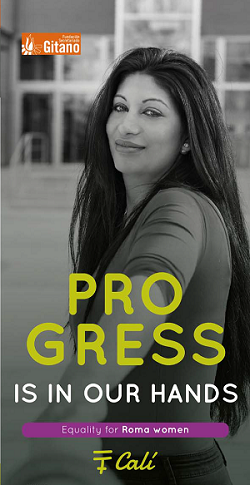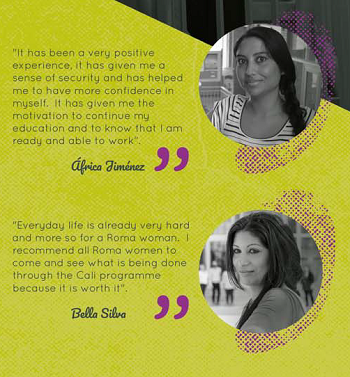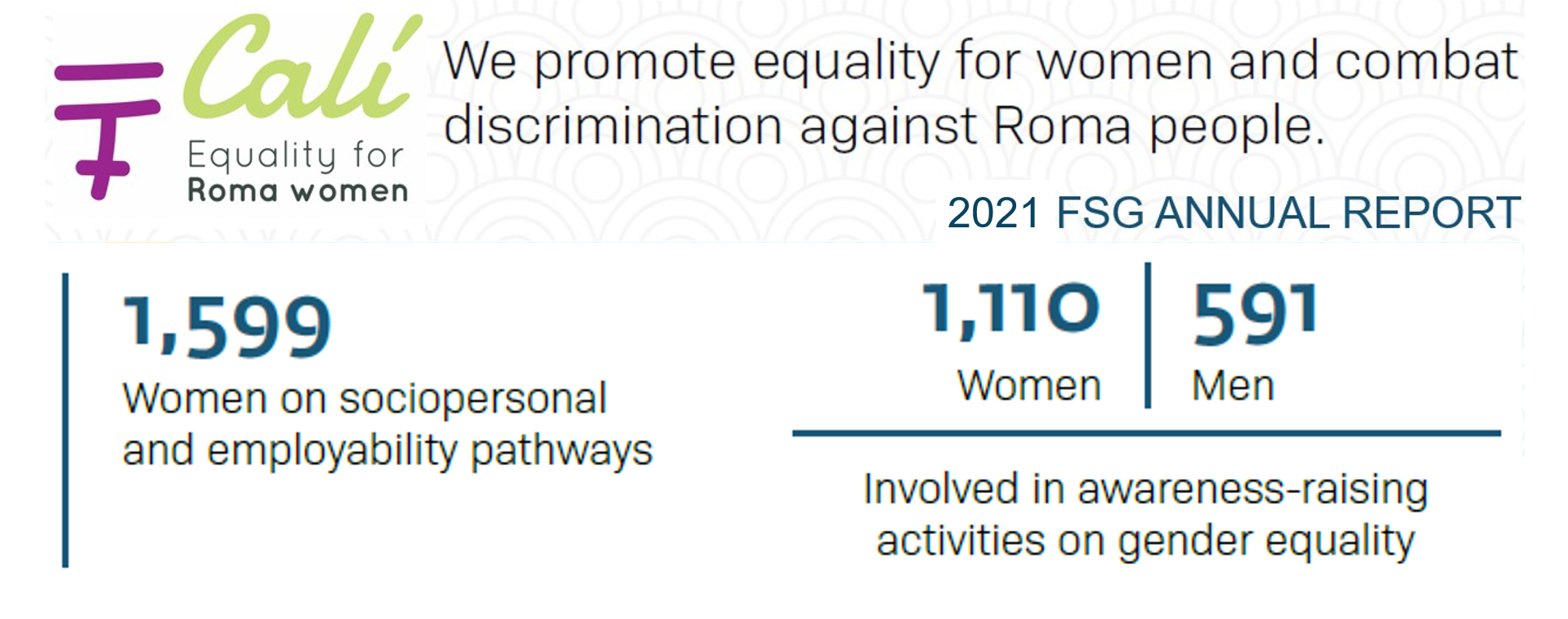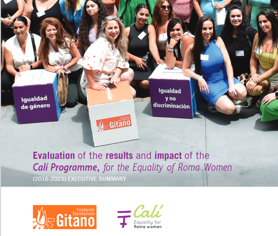“Calí, Roma Women and Equality” FSG´s programme[editar]

Calí Equality for Roma women
 This programme addresses the specific needs of Roma women, based on a sound knowledge of their realities.
This programme addresses the specific needs of Roma women, based on a sound knowledge of their realities.
The aim of the programme is to promote the personal development of Roma women who are in a situation of special vulnerability, in order to enable them to fully exercise their rights as citizens, and to also strengthen their abilities and competences, in order to improve their chances of finding a job.
From an individualised and intercultural approach, the programme offers tailored support, along with group and community work.
This programme also tackles key issues such as: the equal treatment of Roma people and the multiple discrimination against Roma women, by providing support and advice in cases of discrimination and by increasing Roma women´s awareness of their rights through group sessions.
This pioneering programme is implemented in 30 cities across Spain by a team of 33 female professionals, 27 of them Roma, who have received specialised training.
With the support of the Social Inclusion and Social Economy Operational Programme (POISES), the Calí programme complements the work FSG has been developing for years under the European Social Fund, promoting access of Roma to the labour market, shining now a light on the inequality and multiple discrimination Roma women suffer.

Objectives
- Enhance the social inclusion of Roma women as well as their access to employment through actions that contribute to the development of their social, employability and personal skills and that promote gender equality, participation and work-life balance.
- Combat discrimination and promote equality by informing, assisting and accompanying victims of all kinds of discrimination, with special attention to cases of multiple discrimination Roma women face.
- Boost gender equality between Roma men and women and support breaking down cultural and social barriers that prevent Roma women´s social and economic promotion.
- Support and accompany Roma women suffering domestic violence.
- Raise awareness among society, public policy-makers, those working in relevant sectors (i.e. teachers, social or health care professionals etc), the economic operators or the Roma community itself, about negative stereotypes regarding Roma and, Roma women, in particular,.
- Influence policies on gender equality, equal opportunities and non-discrimination.
 Roma women (both, Spanish and of immigrant origin) with low employability, low-skills, low education levels, poor socio-economic conditions, with family responsibilities
Roma women (both, Spanish and of immigrant origin) with low employability, low-skills, low education levels, poor socio-economic conditions, with family responsibilities- Roma people victims of discrimination, in particular Roma womenexperiencing multiple discrimination.
- Roma women victims of domestic violence, or those who are at risk.
- The Roma community in general, including men and women across all age groups.
Lines of action
- Direct intervention with Roma women, based on a sound knowledge of their specificity and on the development of personalised support pathways in order to improve their social, personal and employability skills, and provide support in situations of particular vulnerability such as cases of domestic violence.
- Promotion of equal treatment and non-discrimination of the Roma community, in particular Roma women. We use a protocol for cases of discrimination, based on the detection, information, assistance and accompaniment in the exercise of their rights.
- Group and community work (Roma men and women across all age groups), as a means to increase awareness, prevent, motivate and change attitudes in order to break down the barriers that cause gender inequality and make reconciliation of personal, family and work life difficult.
- Group sessions with Roma men and women of all ages to inform them about their rights and how to exercise them. As a way also to deal with the underreporting of cases of discrimination.
- Actions aimed at achieving changes in structures, systems and policies in order to eliminate the obstacles that prevent Roma women´s socio-economic promotion, the defence of their right to non-discrimination, or access to their full rights as citizens, along with awareness-raising and advocacy activities and training of professionals.

Evaluation of the Results and Impact of the Calí Programme, for the Equality of Roma women 2016-2023
In 2023 an independent Evaluation of the Results and Impact of the Calí Programme, for the Equality of Roma women 2016-2030 was presented. This report showed relevant results of the Programme:4 676 Roma women in a situation of high social vulnerability have participated since the Programme began in 2016. Of these, 56% are between 25 and 45 years of age; 46% live on less than €500/month and 70% have dependent minors. 63% have a primary school education.
These women have worked with individualised pathways to favour their social inclusion and their pre-employment training and employability. A total of 1 546 training courses on personal development and 406 occupational and digital skills courses have been set up. As main results, 2 457 women have started an active job search and 704 of them have found a job. In addition, 280 have returned to formal education.
Calí has also accompanied 392 women in cases of gender-based violence and has implemented 2 736 awareness-raising activities on gender equality, co-responsibility and prevention of violence in which 17 209 women and 9 422 men have participated.
The Calí Programme has dealt with 1 708 cases of ethnic discrimination and antigypsyism and has carried out 246 awareness-raising activities on antigypsyism in which 5 232 key agents, including State security forces, have been trained. In addition, 924 awareness-raising activities on equal treatment and the fight against discrimination have been carried out with the participation of 5 152 women and 2 994 men.
The impact study concluded that the programme is "relevant, efficient and coherent with the needs of the participants, as well as effective in achieving its objectives". Specifically, the research carried out to evaluate the programme has found a positive and significant impact on the lives of the participants, mainly in the fight against discrimination and antigypsyism, the development of personal skills and employability. 92.5% of the women participants expressed their satisfaction with the Calí Programme.

More information







